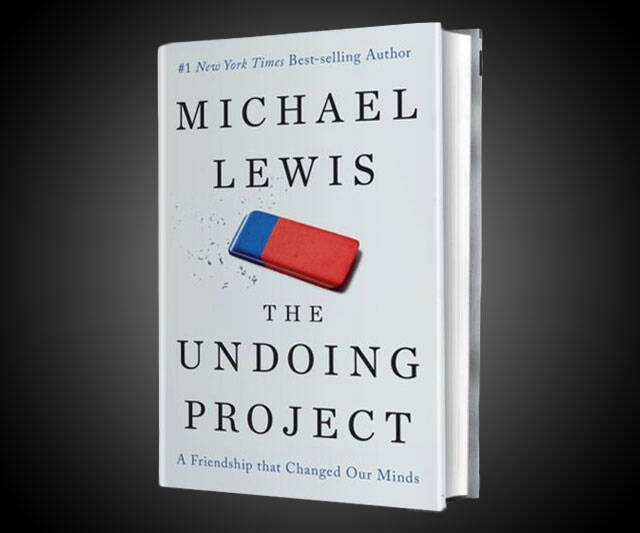The Undoing Project | ||||||||||||
| ||||||||||||
Product Description
How a Nobel Prize–winning theory of the mind altered our perception of reality.
Forty years ago, Israeli psychologists Daniel Kahneman and Amos Tversky wrote a series of breathtakingly original studies undoing our assumptions about the decision-making process. Their papers showed the ways in which the human mind erred, systematically, when forced to make judgments in uncertain situations. Their work created the field of behavioral economics, revolutionized Big Data studies, advanced evidence-based medicine, led to a new approach to government regulation, and made much of Michael Lewis’s own work possible. Kahneman and Tversky are more responsible than anybody for the powerful trend to mistrust human intuition and defer to algorithms.
The Undoing Project is about a compelling collaboration between two men who have the dimensions of great literary figures. They became heroes in the university and on the battlefield―both had important careers in the Israeli military―and their research was deeply linked to their extraordinary life experiences. Amos Tversky was a brilliant, self-confident warrior and extrovert, the center of rapt attention in any room; Kahneman, a fugitive from the Nazis in his childhood, was an introvert whose questing self-doubt was the seedbed of his ideas. They became one of the greatest partnerships in the history of science, working together so closely that they couldn’t remember whose brain originated which ideas, or who should claim credit. They flipped a coin to decide the lead authorship on the first paper they wrote, and simply alternated thereafter.
This story about the workings of the human mind is explored through the personalities of two fascinating individuals so fundamentally different from each other that they seem unlikely friends or colleagues. In the process they may well have changed, for good, mankind’s view of its own mind.
Top Reviews
Behavioral finance - avoid being prey on the way to a Nobel Prizeby Max Rudolph (4 out of 5 stars)
October 27, 2017
I tend to get excited when the best story tellers write a new book, and when the book covers a topic I have been focused on recently this is even more so. Such was the case when Lewis covered the Nobel Prize winning duo of Daniel (Danny) Kahneman and Amos Tversky, two psychologists who developed much of the base work behind behavioral finance. I also see its roots in Robert Cialdini's books (Influence, Pre-suasion). While Kahneman (Tversky died in 1996 so did not share in the Nobel) wrote Thinking Fast and Slow to share their life work, here Lewis tries to identify why they worked so well together. In fact I don't recall him talking about thinking fast (immediate response) or slow (long-term investor) at all. It reads somewhere between biography and non-fiction about behavioral finance.
Some of the more interesting thoughts in the book have nothing to do with behavioral finance, but have lots to do with psychology. Lewis discusses Daryl Morey, who I would call a basketball sabermatrician. He has been GM for the Houston Rockets since 2007 using tactics similar to those described for baseball in the book Moneyball (also by Lewis). In this same chapter Lewis provides a definition of a nerd - a person who knows his own mind well enough to mistrust it. This sounds like something Charlie Munger would say (high praise).
Both Kahneman and Tversky lived in Israel, where everyone serves a stint in the military, and both saw action in the Six Day War in 1967 and the Yom Kippur War in 1973 (when they returned from America to take up arms). Kahneman helped the Israelis design better tools for selecting officers and training pilots. Tversky was a paratrooper. Both were professors at Hebrew University at the beginning of the first war.
Our mind tricks us. After the fact, we know exactly why we saw the event coming that no one anticipated (see Taleb's Black Swan) and surveys weigh more heavily toward events that have recently occurred. The reasons often given relate back to our days as prey on the plains of Africa (thinking fast keeps you alive in that context - you run away from a predator, as fast as you can). One of the ways to catch these inconsistencies is to devise three options, where a person chooses A over B, B over C, and C over A. This violates the law of transitivity, familiar to anyone who has ever studied algebra or logic. Lewis provides many of these examples, as did Kahneman in Thinking Fast and Slow, and I fall for nearly every one. Even after I've seen them before (sometimes, occasionally, I remember).
K/T developed several heuristics, where laws of chance are replaced by rules of thumb. "We often decide that an outcome is extremely unlikely, or impossible, because we are unable to imagine any chain of events that could cause it to occur. The defect, often, is in our imagination."
* Representativeness - we see a previously developed mental model rather than thinking through the facts as presented (and are generally correct). This creates systematic errors, such as looking at a kid and immediately deciding whether they are athletic. Looking at the negative can help avoid these problems. For example, the WW2 bombs landing in London appeared to target certain areas, but really were random. If you have 23 randomly selected people in a room, the odds are better than half that at least two share a birthday.
* Availability - we more easily recall memorable events.
* Conditionality - we make contingent assumptions when none are stated. We assume normal operating conditions (e.g., normal distribution, VaR). "...people don't know what they don't know, but that they don't bother to factor their ignorance into their judgments."
* Anchoring (and adjustment) - if you are shown a large (or small) number, for example, then your response is then large (or small).
* Simulation - what could happen dominates what is likely to happen - this can lead to analysis paralysis (I find it difficult to overcome this when investing for my personal accounts - it's hard to pull the trigger).
* Recency bias - recent events influence our probability assumptions.
* Hindsight bias - once we know how something turns out, our recollection is that we predicted it in advance (similar to Black Swans - Taleb)
How do ideas form in our mind? Is it conscious, or indirect? When we study in school, or for a credential, the focus is on repeating the "right" answer. While hard to grade, I've always thought it would be better to provide an answer and ask the student to improve it.
Who knew that a bad experience could be remembered more fondly if the final part of the event was not so distasteful - the peak-end rule? This was tested using colonoscopies that ended with the medical instruments brought out of the body slowly or quickly. Doing so slowly made it more likely that the person would return for future tests.
The risk manager will discover, usually the hard way, that avoiding a risk receives no reward but if you miss a risk then you will get the blame. This is a human bias.
Accounting does not consider the impact on the environment, to limited supply, or to emotions. Utility theory overstates the value. Risk aversion is a fee willingly paid to avoid regret. In any case we all prefer to avoid pain more than we want to secure gain. We react more to relative changes than absolute ones, and probability is not straightforward.
The benefits of a group often conflict with the benefit to an individual. Antibiotics are such an example. In total, limiting antibiotics is better because viruses have less chance to mutate successfully. For an individual, antibiotics are either useful or neutral. There is no downside to an individual to being treated with antibiotics.
One of the fascinating revelations in the book (for me, at least) was the need to invert. "How do you understand memory? You don't study memory. You study forgetting." As we study other topics we should look for opportunities to utilize this strategy.
While much of the interest in this branch of psychology is applied to investment strategies, K/T worried more about geopolitical biases and the series of avoidable mistakes that could be made by political leaders relying on gut feel. They thought that intelligence reports written as essays should be replaced by probabilities. Telling a story is not helpful in this context, but politicians tend to be afraid of numbers. We have seen evidence of this recently as briefings to the US president are said to be focused on charts and short sound bites.
As you read about financial economics, this should not be your first book. I believe it is more useful to someone already familiar with the concepts from other sources. For someone starting out on this topic I personally like Why Smart People Make Big Money Mistakes and How to Correct Them by Gary Belsky and Thomas Gilovich to start and then Thinking Fast and Slow by Kahneman before reading the Lewis book.
Must release an edited version
by Athan (3 out of 5 stars)
December 22, 2016
With no doubt, I had great fun reading "The Undoing Project."
I was introduced to the work of Tversky and Kahneman as a college sophomore in 1988 by my teacher, hydrologist Joseph Harrington, who was a great admirer of their ideas. The beauty of what is now called "Prospect Theory" has inevitably stuck with me since. It is only in retrospect that I have come to understand it was radical for its time.
So I swallowed whole "Thinking About Thinking" within a week of having read the Michael Lewis review on Bloomberg. And I've since really enjoyed the recent near-autobiography of Richard Thaler's, as well as many of Dan Ariely's books.
Well, you don't have to believe me on this, but Michael Lewis actually explains the concepts better!
No joke, he really does.
And he provides an unbelievably deep, personal and sensitive account of the explosive relationship between the two giants. A very believable account too. The research done by Michael Lewis really shows. He's had phenomenal access too, it seems.
And yet, the book does not hang together terribly well. Chapters 1 and 8 should not have made it into the book, they ought to have been relegated to the pages of Vanity Fair, where the author regularly provides fantastic material.
More to the point, what we have here is a bunch of chapters that, chronological order notwithstanding, do not constitute a book. The incredible material, the wonderful expositions, the deep insights are all present and correct, but they fail to meld into a narrative. Even the title of the book, much as it has its roots in the work of Tversky and Kahneman, does not do justice to their contribution.
It really pains me to say this, especially because the author's previous effort, "Flash Boys," was a genuine five-star book. Perhaps that's the problem. Maybe if I was reading this straight off of "Boomerang" I'd have found it great. As it stands, I'm not sure I could recommend it to the general public.
If, on the other hand, you have the remotest interest in Behavioral Economics, you genuinely can't not read "The Undoing Project" and you are guaranteed to enjoy it.
One of Lewis's best yet
by Derek Zweig (5 out of 5 stars)
October 9, 2017
This is one of Michael Lewis's best books yet. The challenge is to tell the story in a way that describes the behavioral biases without the need for technical discussion. Lewis accomplished this fairly well.
Early in the book he covers the challenge of scouting players in professional sports leagues. He notes the popularity of the halo effect, where scouts see favorable single attributes and let that impression impact the assessment of other attributes. This is later more broadly categorized as representativeness, one of several heuristics individuals use to make decisions with limited information. Representativeness involves the premature characterization and categorization of an object/event/individual based on some attribute that can be easily identified. Other heuristics mentioned include anchoring, when one takes new information and simply makes adjustments to their initial judgement; availability, when one assigns too much weight to the information readily available to them; and simulation, an emotional bias involving the ease with which one can mentally simulate alternatives to reality. While it is acknowledged that heuristics are often times helpful rules of thumb, they can occasionally lead to systematic error.
Representativeness is explained using the 'Linda problem', which asks whether it is more likely that Linda is a bank teller or a bank teller and a member of a feminist organization, when all you're told is that Linda is a feminist. Many respondents chose the latter option, even though the first option contains the second option via a less restrictive description. In other words, if the probability of Linda being a bank teller is 10%, and the probability of her being in a feminist organization is 99%, then the first option has a 10% chance of being correct, while the second has a (10% x 99%) chance of being correct (which is less than 10%). Availability bias is similarly explained using a problem that asks whether a particular book has more words with the form _ _ _ _ ing or _ _ _ _ _ n _. Since words ending in 'ing' are easily thought of, respondents chose the first option, ignoring the fact that the second option includes all words that also meet the first option. Availability is explored further, as Lewis explains how Kahneman and Tversky attack practitioners for over-extrapolating from small sample sizes.
Consumer decision biases are touched on as well. First, it is explained how individuals do not appear to update probabilistic outcomes using a Bayesian process in real world decision-making. Experimentation has also uncovered the fact that human consumption decisions do not follow laws of transitivity. In other words, if a consumer prefers A to B and B to C, they may sometimes also say they prefer C to A. They ultimately explain this by breaking A, B, and C down into individual features, and analogize a person purchasing A to them really purchasing a bundle of features represented by A. In so doing, they realized that not only are small preferential differences in particular features virtually ignored, but exact comparison is often not possible since different objects have different bundles of features. Additionally, they found that individuals exhibit an endowment bias in exchange transactions, assigning more value to items that they already own simply because they already own it.
Perhaps the greatest achievement of Kahneman and Tversky was challenging and offering an alternative to Bernoulli's utility theory. Utility theory effectively explained certain behavior by labeling individuals as either risk tolerant, risk neutral, or risk averse. If faced with choosing between $50 for free or taking a 50% chance of winning $100 or $0, a risk neutral individual would be indifferent to the decision. A risk averse individual would take the free $50 and avoid the odds, since the utility they get from the first $50 is higher than that of the second $50. Thus individuals do not rely on pure probabilistic payoff odds. However, utility theory has not held up under centuries of scrutiny. Kahneman and Tversky added to this topic with the concept of regret aversion, where individuals place undue weight on potential negative outcomes, and then again with loss aversion, where individuals will actually be willing to take more risk (as a risk tolerant individual would in Bernoulli's framework) when faced with the same decision as above but with losses instead of gains. In other words, if choosing between an assured $50 loss or taking a 50% chance of losing $100 or $0, an individual who is risk averse on the gains side may choose to be risk tolerant on the loss side.
The above discoveries are detailed along-side an interesting story about Kahneman and Tversky's long personal and professional history together. Overall, very enjoyable.
A great story, well told. but perhaps missing something important to you
by Wally Bock (4 out of 5 stars)
April 5, 2017
The Undoing Project: A Friendship That Changed Our Minds, by Michael Lewis, is a well-written story about two people who developed some important ideas. This book is a well-told story, but that's both its strength and its weakness.
The story is about the ideas and relationship of Amos Tversky and Daniel Kahneman. They are two Israeli psychologists who wrote a paper that was published in the journal Science in 1974 about the systematic ways that we often make mistakes in our thinking and decision-making. Knowing that, here are some ideas about who will like this book.
Who Should Read This Book
If you've heard something about heuristics and biases in decision-making, or if someone has recommended that you read Kahneman's book, Thinking Fast and Slow, but you don't know if you're quite ready for that, this book will be a great read. By telling the story about the development of the ideas that Kahneman and Tversky produced, you get a brief introduction to most of them and to why they're important.
If you like good stories about how creative people work together to produce great things, you should like this book, too. Kahneman/Tversky's relationship was what some psychologists call a "fertile pair." It is as much an intellectual marriage as it is a partnership, and the story of the relationship is intertwined with the development of both the ideas and the participants.
If what you want is a simple introduction to heuristics and biases in decision-making, this probably won't do the trick. It's the story of how two psychologists developed their thinking, so you'll pick up some things, but it's the story of the relationship of Tversky and Kahneman and not a treatise on heuristics and biases.
What's in the Book
Lewis opens the book with a story about Daryl Morey, the general manager of the Houston Rockets, and how he set out to use data to improve the decisions involved in running that team by basing those decisions on evidence, data. He quickly discovered that while data was important, there seemed to be problems in the way that people used data, the way they think. No matter how good the data is, human beings make predictable and systematic errors in the way we think and make decisions. The work of Tversky and Kahneman is all about those predictable and systematic errors.
From the Rockets, Lewis takes us to World War II and occupied Paris to introduce us to the young Daniel Kahneman. He migrates to Israel where he and Amos Tversky meet. Kahneman is quiet and self-effacing and French. Lewis describes Tversky as "a swaggering sabra. They form one of the most productive partnerships in modern science, even though they are very different people.
That difference is a source of tension and problems, but it's also the source of the rich ideas they developed together. Because it's a story about their relationship and not a book about decision-making, Lewis leaves out a lot. For example, if you only read this book, you will think that Kahneman and Tversky coined the phrase "heuristics." (Location 2407) That's not the case.
One of my majors in college was Management Science. I learned there were basically three kinds of problems. Some problems could be reliably solved with a recipe. If you got the right ingredients and put them through the right process, you would get a reliably good solution. Other problems required creative solutions because they were unique.
Between those two, there was a class of decisions which I learned could be solved with heuristics, which were defined as guidelines or rules of thumb. Don Sull's recent book, Simple Rules, is a good introduction to that way of thinking.
Lewis is writing a book about Kahneman and Tversky and their relationship and their work. He includes things which help tell that story. He leaves out thing which don't help move the story along. And he does everything he can to help us see the world through the lens of the Kahneman/Tversky relationship.
Take the case of Gerd Gigerenzer. He's a German psychologist. If the only thing you read about him is Lewis's book, you'll see him as an irrational and jealous opponent of Kahneman and Tversky. But that's not the whole story, by a long shot.
Gigerenzer comes from the point of view of Herman Simon, the American psychologist who gave us the terms "suboptimize" and "satisfice." Gigerenzer starts from the idea that humans have bounded rationality and he sees heuristics (decision rules) as a way to make decision-making in certain situations better and faster. You might want to know more about his background, and thoughts, but Michael Lewis only gives you the part of his work that's relevant for his story about Kahneman and Tversky.
Bottom Line
If you want to read a great story of Daniel Kahneman and Amos Tversky and the ideas they developed, pick up this book and read it. You'll love it.
If all you want is an introduction to those ideas without the story of their development, read Kahneman and Tversky's 1974 paper from the journal Science. The title is "Judgement Under Uncertainty: Heuristics and Biases." The basics that they outline there still rule a lot of the discussion.
If you want a brief but helpful discussion of heuristics as guidelines or rules of thumb, pick up a copy of Don Sull's book, Simple Rules.
If you want to go deep into Kahneman and Tversky's ideas, you're going to have to pick up Kahneman's great book, Thinking Fast and Slow. It's a book that will take some effort to read because the ideas are dense, and even though they are well-presented, they're not cloaked in the clothes of story. If you're willing to do the work, though, Thinking Fast and Slow may be one of the most important books you ever read. It's that importance that spurred Michael Lewis on to writing The Undoing Project.
A friendship that revolutionized psychology
by Charlie,Top Contributor: Philosophy (5 out of 5 stars)
December 9, 2017
The Undoing Project is the amazing story of the friendship between Daniel Kahneman and Amos Tversky, and how that friendship revolutionized the field of psychology. These two were opposite in nature but shared a mutual understanding in the way of their thinking. Their ideas seem so simple and straightforward, yet until they presented them, no one else had considered them. The book tells the story of how they questioned the conventional thinking and demonstrated the biases that inherent in all of us. The importance of these discoveries is that once identified, they are more manageable and help explain various phenomena.
I had heard these two names frequently cited and enjoyed their book "Thinking Fast and Slow" but I was unaware of their unique backgrounds and the story of how they came to meet and other interesting aspects of the relationship. This book is written like Michael Lewis's other books- fast paced, well organized, clear and entertaining and is highly recommended.
Edifying and enjoyable, worth reading.
by Shulamit Widawsky (5 out of 5 stars)
June 12, 2018
What a great read.
Not a perfect read, and if I could give it 4.5 stars, I would. But given the necessity of choosing between 4 and 5, knowing a 5 will help the book get more readers, I'm giving it 5 stars. This is a worthwhile read for anyone who likes to think.
Truly, I'd love to see this book be required reading in high school. The book offers two excellent insights: 1. How people successfully work together as partners in intellectual or academic projects, and what can go wrong in such partnerships if they don't put the partnership above their individual needs. and 2. The common ways people make mistakes in thinking and decision making.
The book is as much about the relationship between Amos Tversky and Daniel Kahneman, as the work they did. Danny Kahneman went on to win a Nobel Prize for the work, after Amos died. Danny also wrote a book about the work, called Thinking, Fast and Slow which is surely worth reading, and gets deeper than this book into the accomplishments Tversky and Kahneman made in decision theory. But "The Undoing Project" is written by Michael Lewis, the author of "Moneyball" and "The Big Short" and is simply a more enjoyable book to read.
If you already know something about decision theory, and only want to dig deep into decision theory according to Danny Kahneman, by all means, buy "Thinking, Fast and Slow." If you are not familiar with Kahneman and Tversky, or not familiar with decision theory, get this book. It is fascinating, well-written, and not shallow. There are some chapters that wander a bit, or a paragraph here and there that could have been better edited. Still, absolutely worth your time. Enjoyable and edifying, rare to have both those qualities in a book.
another Michael Lewis classic...
by Reid McCormick (5 out of 5 stars)
October 10, 2018
"The difference between being very smart and very foolish is often very small" - Amos Tversky
Like most students in college, I changed my major a few times while I tried to discover my calling and by accident, I received a minor in psychology. I found psychology somewhat interesting but I never considered it as a course of study. I only ended up with a minor because I needed two more classes for credit and by taking two extra psychology courses I received the minor.
However, I do not recall learning about of Amos Tversky and Daniel Kahneman during my undergraduate studies. Perhaps their work had not caught on at my university or their work is a bit too advanced for feeble undergraduate minds. Or I did not pay attention, that is a very valid possibility..
I first learned about Tversky and Kahneman reading other books in social sciences, behavioral economics, and the what not. Every time their names emerged, I found their work incredibly interesting. I finally got the courage to read the comprehensive Thinking, Fast and Slow by Kahneman. I was dumbfounded. I felt smart and stupid at the same time.
The Undoing Project is not a simple book to describe. It is a book about the great works of Tversky and Kahneman and how their work changed not only psychology but business, sports, military operations, government, etc. But the book is also about the great relationship between these two men. They start as perfect strangers, turn into unlikely friends, and develop into a close working relationship.
Micheal Lewis's writing is riveting. The book feels almost like you are reading a mystery novel. You have no clue where the story is headed but you are very excited to turn the page.
This is a great book and easily one of my favorite books this year.
Caution! Unless you are totally into psychology, take a pass on this one.
by SRC (2 out of 5 stars)
June 2, 2019
When this book was chosen for my book group, I looked forward to reading it. I have read other Michael Lewis books and totally enjoyed them, even when the topics were not a subject I was particularly interested it. Baseball! Derivatives! Why not psychology? Lewis' books always had energy and told an interesting tale. Not so with The Undoing Project. Nearly halfway through I stopped to read some reviews of the book because I had no idea what it was about or where it was going. Many of the reviews were good, so I persevered. I felt as if I was reading a textbook for a class I had to take, but had no interest in. It was tedious reading. It went back and forth in time in a stream of consciousness way that didn't move the story forward. In fact, I'm still not sure there was a story. To me it feels as if Michael Lewis was having so much fun delving into the lives of two eminent psychologists that he forgot about his readers. There is no flow to the story and no energy to make you want to continue reading. I still think Lewis is an excellent writer, but not this time!
A story about thinking clearer
by DGB (5 out of 5 stars)
April 2, 2018
Writing a positive review of a Michael Lewis book seems like clapping in a crowd of people already clapping -- it is hardly needed as an aid to those wondering if they should buy this book. If you aren't sure yet, I doubt this review can help.
Still, I wanted more to express my appreciation than to add one more endorsement. I have a doctoral degree in what is now called decision sciences, were once operations research or statistics. I studied Tversky's and Kahneman's work well before they were famous and even while they were still regarded as marginal, if not a distraction, in decision analysis. So I've been a witness to the trajectory of this material in mainstream scholarship. Kahneman's book (Thinking Fast and Slow) is a compendium of their life's work and although I enjoyed the book, I had read almost all of it in other places over the years. So I wasn't sure what to expect when I bought this book. What I got was the insights of an astute observer who had a ringside seat -- Lewis talking to Kahneman and his colleagues. It's a great story, it grounds the intellectual insights in the personalities and life-experiences of the two researchers, and makes the whole of their insights as a body of work accessible, able to be appreciated as a whole, and even applicable in some ways.
There are so many self-help books available on how to be happy or a leader or influential (think of "how to manipulate" books by derivative authors like Cialdini). There are few books on how to be a clear thinker. This is a story about how challenging that is and some tips on how to make progress.
Not sure what the theme is here
by Beth61 (3 out of 5 stars)
November 28, 2017
I loved Michael Lewis's other books and couldn't wait to read this. While it is interesting in some places, it really starts to drag after the middle. He starts out with a premise that the methods he explained in Moneyball have limitations. He uses Tversky and Kahnemann to explain some of the shortcomings in the Moneyball theory. Then he gets mired down in the story between the two and never ties what he learned by his investigation into their theories back to how he would modify the Moneyball theory or what the real life applications would be. It seems like he had a deadline to hit and just ended the book abruptly without finishing it.
Customers Who Bought This Item Also Bought
- Nudge: Improving Decisions About Health, Wealth, and Happiness
- What the Dog Saw: And Other Adventures
- Thinking, Fast and Slow
- Liar's Poker: Rising Through the Wreckage on Wall Street
- The New New Thing : A Silicon Valley Story
- The Big Short: Inside the Doomsday Machine
- Misbehaving: The Making of Behavioral Economics
- Boomerang: Travels in the New Third World
- Flash Boys
- The Fifth Risk
*If this is not the "The Undoing Project" product you were looking for, you can check the other results by clicking this link








